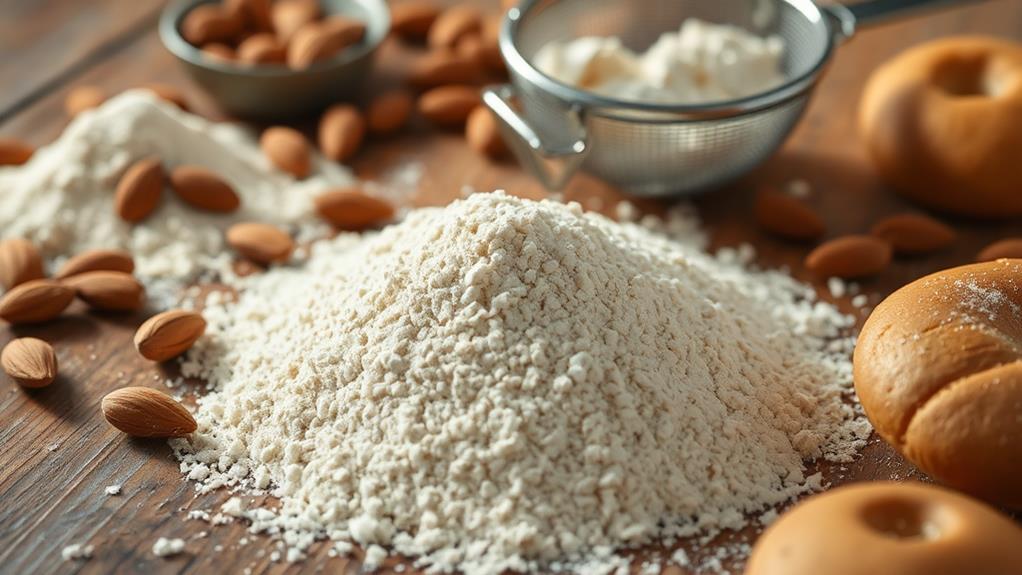When seeking the best almond flours, you’ve got excellent options. PuroRaw’s 2lb Almond Flour offers a superfine texture ideal for baking, while Food to Live’s 4-pound Organic Almond Flour boasts a long shelf life and rich vitamin content. Wellbees’ Extra Fine Almond Flour excels in creating cookies and macarons, and Wholesome Yum’s Premium Fine Blanched Almond Flour is perfect for low-carb diets. These top picks provide versatility, nutritional benefits, and superior texture for your gluten-free creations. As you explore these options, you’ll discover key factors that’ll help you choose the perfect almond flour for your needs.
Key Takeaways
- PuroRaw Almond Flour offers superfine powder ideal for baking, with high protein and fiber content.
- Food to Live Organic Almond Flour provides extra fine, organic options rich in essential vitamins.
- Wellbees Almond Flour features an extra fine texture and is excellent for various baking applications.
- Wholesome Yum Premium Almond Flour is super finely ground from California almonds with low net carbs.
- Consider texture, nutritional profile, certifications, and packaging when choosing the best almond flour for your needs.
Almond Flour (2lb) by PuroRaw
For health-conscious bakers and those with dietary restrictions, PuroRaw’s 2lb Almond Flour offers versatility and nutrition in one package. This superfine powder, made from blanched almonds, comes in a resealable pouch and is 100% all-natural and non-GMO. You’ll find it perfect for a variety of baked goods, from cakes and cookies to pancakes and breads.
If you’re following a specific diet, you’ll appreciate that this almond flour is gluten-free, grain-free, soy-free, kosher, vegan, paleo, and keto-friendly. It’s low in carbs but high in protein and fiber, making it a nutritious alternative to traditional flours. You can use it on its own or blend it with all-purpose flour to reduce gluten content. While users praise its fine texture and versatility, keep in mind that it may not rise as much as wheat flour in some recipes.
Best For: Health-conscious bakers, those with dietary restrictions, and individuals following gluten-free, grain-free, paleo, or keto diets.
Pros:
- Versatile ingredient suitable for a wide range of baked goods
- High in protein and fiber, low in carbs
- 100% all-natural, non-GMO, and comes in a resealable pouch
Cons:
- May not rise as much as wheat flour in some recipes
- Slightly more expensive than traditional flour
- Some users may find the nutty flavor overpowering in certain dishes
Food to Live Organic Almond Flour (4 Pounds)
Health-conscious individuals seeking a versatile, organic almond flour will find Food to Live’s 4-pound offering an excellent choice. This extra fine, blanched almond flour is non-GMO, low-carb, and suitable for various diets, including keto, paleo, and vegan. It’s also kosher certified.
Rich in vitamins and minerals, particularly vitamin E, magnesium, potassium, and folic acid, this flour can be used as a substitute for breadcrumbs and wheat flour. You’ll find it ideal for baking vegan cakes, cupcakes, pancakes, waffles, and hot cereal mixes. With a long shelf life of up to 1.5 years when stored properly, you can keep it fresh by sealing it tightly in a cool, dry place. While customers generally praise its quality and taste, some have expressed concerns about moisture levels in larger bags and potential gluten cross-contamination due to shared facilities.
Best For: Health-conscious individuals following keto, paleo, or vegan diets who need a versatile, organic, low-carb alternative to wheat flour for baking and cooking.
Pros:
- Nutrient-rich with vitamins and minerals, especially Vitamin E, Magnesium, Potassium, and Folic acid
- Versatile use as a substitute for breadcrumbs and wheat flour in various recipes
- Long shelf life of up to 1.5 years when stored properly
Cons:
- Some customers report concerns about moisture levels in larger bags
- Potential for gluten cross-contamination due to shared facilities
- Higher price point compared to conventional flours
Wellbees Almond Flour, Gluten Free & Extra Fine (2 lbs)
Gluten-free bakers and health enthusiasts will appreciate Wellbees Almond Flour’s extra fine texture and purity. Made from 100% skinless almonds without additives, this flour is pasteurized using boiling water and steam. It’s packed with protein and fiber, making it a nutritious alternative to wheat flour.
You’ll find this almond flour ideal for baking and frying. Remember, 4 cups equal 1 pound, and it’s best to use recipes designed specifically for almond flour. Many users report excellent results in cookies, fried chicken, and macarons. The super fine consistency closely resembles wheat flour, and cookies made with it tend to hold together better than those made with regular almond flour.
While most customers praise the product’s quality and performance, a few have reported unpleasant odors. However, Wellbees’ responsive customer service has addressed these concerns promptly.
Best For: Gluten-free bakers, health-conscious individuals, and those following low-carb diets who want a high-quality, versatile almond flour for baking and cooking.
Pros:
- Extra fine texture closely resembling wheat flour
- Made from 100% pure skinless almonds with no additives or preservatives
- Excellent for various recipes, particularly cookies and macarons
Cons:
- Some users reported unpleasant odors in certain batches
- More expensive than traditional wheat flour
- Requires specific recipes as it behaves differently from wheat flour
Wholesome Yum Premium Fine Blanched Almond Flour
Keto and low-carb dieters will appreciate Wholesome Yum Premium Fine Blanched Almond Flour as an excellent alternative to traditional wheat flour. This 16 oz package offers a versatile, gluten-free option made from premium California almonds. It’s super finely ground, ensuring ideal texture in your baked goods.
You’ll find this flour perfect for various recipes, including bread, pancakes, muffins, and even as a breading for chicken. With only 2g net carbs per serving and zero glycemic impact, it’s perfect for maintaining a low-carb lifestyle. It’s also paleo, diabetic-friendly, and vegan.
Made in the USA, this almond flour boasts high quality and a fine texture without lumps. While some users report issues with the zip lock closure, many praise its versatility in keto recipes and its ability to maintain flavor over time. You’ll enjoy its light texture and effectiveness in your baking endeavors.
Best For: Keto and low-carb dieters looking for a versatile, gluten-free alternative to wheat flour for baking and cooking.
Pros:
- Super finely ground for optimal texture in baked goods
- Low in net carbs (2g per serving) with zero glycemic impact
- Versatile for various recipes including breads, pancakes, and as a breading
Cons:
- Some users report issues with the zip lock closure
- May have longer shipping times when ordered through Amazon
- More expensive than traditional wheat flour
Factors to Consider When Choosing Almond Flours

When you’re shopping for almond flour, there are several key factors you’ll want to contemplate. You should evaluate the texture and grind quality, nutritional profile, certifications, dietary compatibility, taste, flavor, packaging, and storage options. By carefully weighing these aspects, you’ll be able to select an almond flour that best suits your culinary needs and dietary preferences.
Texture and Grind Quality
The texture and grind quality of almond flour play an essential role in its performance and versatility in baking. When you’re selecting almond flour, pay close attention to its grind quality. Superfine or extra fine almond flour is your best bet for achieving smooth batters and doughs that closely mimic the behavior of traditional wheat flour. This finer texture will enhance the consistency of your baked goods, resulting in cookies and cakes with a more appealing mouthfeel.
On the other hand, coarser grinds can lead to graininess in your recipes, potentially affecting both texture and presentation. To guarantee the best results, look for blanched almond flour. This type has had the almond skins removed, offering a lighter color and subtler flavor that’s ideal for baking.
Consistent grind quality is particularly important when working with gluten-free recipes. It helps prevent issues like uneven rising or texture inconsistencies. By choosing a high-quality almond flour with the right texture and grind, you’ll set yourself up for success in your culinary endeavors, whether you’re making delicate pastries or hearty breads.
Nutritional Profile
Beyond texture and grind quality, the nutritional profile of almond flour is a key factor to take into account when choosing the right product for your needs. Almond flour stands out as a nutritious alternative to traditional flours, especially if you’re following a low-carb diet. It’s packed with protein and fiber while being low in carbohydrates, making it an excellent choice for those watching their carb intake.
You’ll find that almond flour is rich in essential vitamins and minerals, particularly Vitamin E, Magnesium, Potassium, and Folic acid. This nutrient density contributes to your overall health and well-being. With only 2g of net carbs per serving, it’s ideal for keto and diabetic-friendly diets, as it has no glycemic impact.
If you have gluten sensitivities or follow paleo and vegan diets, you’ll appreciate that many almond flours are gluten-free and grain-free. However, keep in mind that nutritional benefits can vary based on processing methods and almond sources. It’s important to check for additives or preservatives when selecting your almond flour to guarantee you’re getting the most nutritional value possible.
Certifications and Dietary Compatibility
Choosing the right almond flour involves more than just pondering its texture and nutritional profile. You’ll want to pay attention to certifications and dietary compatibility to guarantee you’re getting a high-quality product that meets your specific needs.
Look for almond flours with certifications like non-GMO, kosher, and organic. These labels indicate that the product has been thoroughly vetted and meets certain standards of quality and sourcing. Additionally, check for options that are gluten-free, grain-free, vegan, paleo, and keto-friendly to accommodate various dietary restrictions and preferences.
When examining labels, avoid products with additives and preservatives. Opt for almond flours that are free from these artificial ingredients, as they’re more likely to align with health-conscious choices. Don’t forget to take into account the nutritional profile, focusing on low carb counts and high levels of protein and fiber for enhanced health benefits.
If you have strict dietary restrictions or allergies, be mindful of potential cross-contamination with gluten-containing products. Some manufacturers process almond flour in facilities that also handle wheat or other gluten sources, so it’s important to check for dedicated gluten-free production if this is a concern for you.
Taste and Flavor
Flavor profile considerations play an essential role when selecting almond flour for your culinary creations. You’ll find that almond flour generally imparts a slightly sweet and nutty taste to your baked goods, enhancing the overall flavor of your recipes. The intensity of this taste can vary depending on the fineness of the grind, with superfine versions often providing a more subtle flavor.
When you’re baking with almond flour, you’ll likely notice a richer taste compared to traditional wheat flour. This makes it a popular choice for gluten-free and low-carb recipes. However, keep in mind that the freshness of the almond flour can impact its taste. Look for well-packaged products that have been stored properly to guarantee the best flavor retention over time.
You may also notice differences in taste depending on the brand and processing methods. Some almond flours are made from roasted almonds, while others use raw almonds. This can affect the final flavor profile of your baked goods. As you experiment with different brands and types, you’ll develop a preference for the almond flour that best suits your taste and culinary needs.
Packaging and Storage
When selecting almond flour, packaging and storage considerations are vital. You’ll want to look for products that come in resealable pouches or tightly sealed containers, as these are essential for maintaining freshness and preventing moisture absorption. While almond flour typically has a long shelf life of 1 to 1.5 years, proper storage is important to preserve its quality.
When shopping, pay attention to bulk packaging options. While they may seem economical, they can raise concerns about moisture levels and product freshness if not stored correctly. Always check for specific storage instructions provided by the manufacturer to make sure you’re maintaining the best quality over time.
Remember that proper storage isn’t just about preserving flavor and texture; it’s also important for preventing potential spoilage or rancidity, which can occur with nut-based products. To maximize your almond flour’s shelf life, store it in a cool, dry place away from direct sunlight. This will help maintain its freshness and prevent any unwanted changes in taste or texture.
Frequently Asked Questions
Can Almond Flour Be Used as a 1:1 Replacement for Wheat Flour?
Almond flour’s fine, flavorful features function differently from wheat flour. You can’t consistently count on a 1:1 replacement. It’s denser and doesn’t contain gluten, which affects texture and structure in baking. You’ll often need to adjust recipes, adding extra binding agents like eggs or xanthan gum. It’s best suited for specific recipes designed for almond flour. When substituting, start with a 1:4 ratio (1 cup wheat flour = 1/4 cup almond flour) and experiment from there.
How Long Does Almond Flour Last Once Opened?
Once you’ve opened your almond flour, it’ll typically last about 4-6 months when stored properly. To maximize its shelf life, keep it in an airtight container in a cool, dry place. You can also extend its longevity by refrigerating or freezing it. If you notice any off smells, discoloration, or signs of mold, it’s best to discard the flour. Always check the expiration date and use your senses to determine if it’s still good to use.
Is Almond Flour Suitable for People With Nut Allergies?
If you have a nut allergy, almond flour isn’t suitable for you. It’s made from ground almonds, which can trigger severe allergic reactions in those with nut allergies. You should avoid it completely and opt for alternative flours like coconut, rice, or chickpea flour instead. Always check labels carefully, as some products may contain traces of nuts even if they’re not the main ingredient. When in doubt, consult your allergist for personalized advice on safe alternatives.
Can You Make Your Own Almond Flour at Home?
Yes, you can easily make your own almond flour at home. You’ll need blanched almonds and a food processor or high-powered blender. Simply pulse the almonds in short bursts until they reach a fine, powdery consistency. Be careful not to over-process, or you’ll end up with almond butter. Sift the mixture to remove any larger pieces. It’s a cost-effective alternative to store-bought almond flour, and you can control the texture to suit your needs.
Does Almond Flour Contain Fewer Carbohydrates Than Regular Flour?
Did you know that almond flour contains 75% fewer carbs than wheat flour? You’ll find that almond flour is indeed lower in carbohydrates than regular flour. It’s a great option if you’re watching your carb intake. One cup of almond flour has about 10 grams of carbs, while wheat flour has around 95 grams. This makes almond flour a popular choice for low-carb and keto diets. You’ll get more protein and healthy fats with almond flour too.








